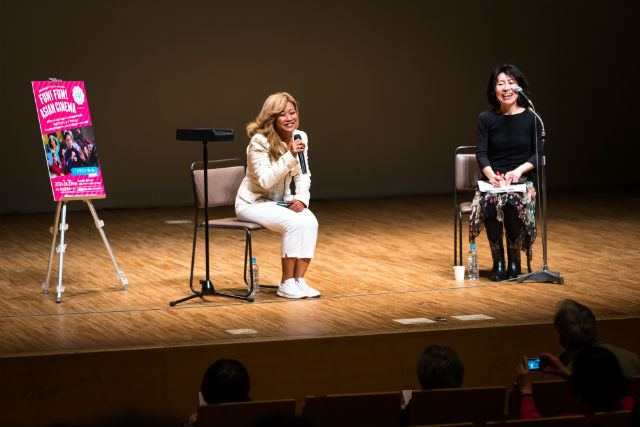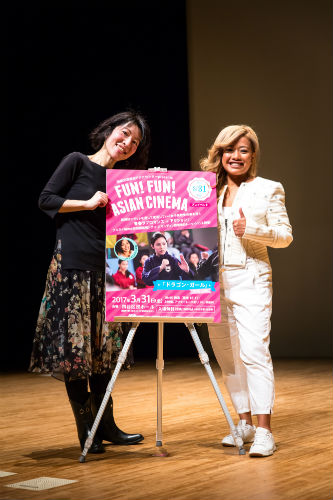Freedom of Expression in Brunei
Audience 5: I would like to ask about the depiction of action, violence, and sexuality in films in Brunei. In Japan, for instance, those elements are frequently used and enjoyed, but considering Brunei is an Islamic country, how is freedom of expression maintained?
Kamaluddin: We do have censorship in Brunei. As you said, we are an Islamic country so sexual content is a big "no-no." But action is fairly flexible. Many people who haven't seen Yasmine automatically assume that Yasmine can't fight because she is a girl and a Muslim. But this is not the case. It is okay for women to fight; in fact, if I am not mistaken, our first gold medalist for combat in silat was a woman. So, it is really just sexual contents that get censored.
It is also interesting to think about violence because, although the motif is a form of martial arts and therefore can easily be associated with survival or fighting, I wanted Yasmine to be about love. I wanted to portray love and growing up through martial arts. I am not a martial artist, but I do understand that when we want something, we strive to obtain and earn it. And along the way you also learn and evolve. Even if the initial intention may have been wrong, you develop your own path and eventually come to a decision or discovery, which is what Yasmine did. I think it really is the process; it doesn't matter where you come from or what you are doing. Everyone argues with their families, has troubles with their friends, boyfriends, and girlfriends, and we learn from each of these experiences. That, I think, is the same for everyone no matter what their backgrounds are, and I think that story of growing up runs true to the language of film.
Time Spent on Working on First Feature Film and Future Prospects
Audience 6: I assume you faced many obstacles in making your first feature film. Could you tell us how long in total it took to complete it?

Kamaluddin: From start to finish, it took three years to write the story, three months for pre-production, and during this time the actors did their training. And we had forty-five days to shoot it due to budget reasons, but I took the time for editing. It was funny because even then, even during editing, I was working with someone who was new to me, and we would get to know each other as we worked. This film really was made with a lot of love from everyone. Counting back from the fundraising phase, I think it took four years in total, and it's condensed into two hours. So thank you for watching it.
Audience 7: I liked the portrayal of the years and feelings that are specific to teenagers. It was very genuine, I think. I am curious to know what eventually happened to the relationship between Yasmine and her love interest.
Kamaluddin: I think it would be more fun for you to decide for yourself what happened to them [smiles].
Audience 8: What have you got planned next? Are you preparing anything for the near future?
Kamaluddin: I'm afraid I can't talk about it because I haven't been given permission yet from the producers. But it is a period piece. I am still researching and writing it, and if all goes well, I think we will start shooting next year.
Matsushita: Thank you very much, Siti. I'm afraid it is time to wrap it up. Thank you all for your comments too. We had to rush a bit, but I am extremely happy to have shared this film with you all. Thank you again for coming.

Plates: Courtesy of 108 Media Corp
Photo (Screening & After Talk): Shinichiro Mikuriya






